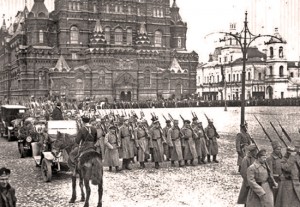((Bolsheviks in Moscow. Digital image. The Russian Civil War: 1917-1920. Accessed February 7, 2016. http://www.emersonkent.com/wars_and_battles_in_history/russian_civil_war.htm))
In the U.S., there seems to be a commonly held misconception about the emergence of Soviet Russia and its relationship with its surrounding neighbors. From my history classes, I remember learning about Russia leaving World War I and the basics of the Russian Revolution. However, after that period, it seems that Russian history just disappears until World War II. Suddenly, Russia became our uneasy ally. I recall hearing the negative effects of the Great Depression on the Russian economy, like it had for all major global economies; however, aside from that, it was mostly Roaring Twenties and the New Deal. Since Soviet Russia grew in size from WWI to WWII and, as a class, we never really touched upon Russia; we were left to assume that the leaders of Russia thought it best to expand immediately. Reading these documents proved my assumptions wrong.
Russia’s transition from a new government to the might USSR was not as smooth. In fact, the documents provide evidence of the Bolsheviks pushing to help like-minded individuals in neighboring areas. For example, in the “Council of People’s Commissars, Decree on Recognizing the Independence of the Estonian Soviet Republic,” the response detailed in the document pushed for Estonian independence. This concept is contrary to what many students in the US are likely led to believe. The Council of People’s Commissars not only recognized the independence of the newly founded Estonian Soviet Republic, but pushed for both military and economic aid. These ideas are supported in two of the other documents, which essentially both call for the unity of Russian laborers in a global fight for freedom against the bourgeoisie and imperialists. It appears, however, that once Stalin took over control of the government, he sought to enforce these ideals strictly and militarily, as opposed to in a friendlier manner.

